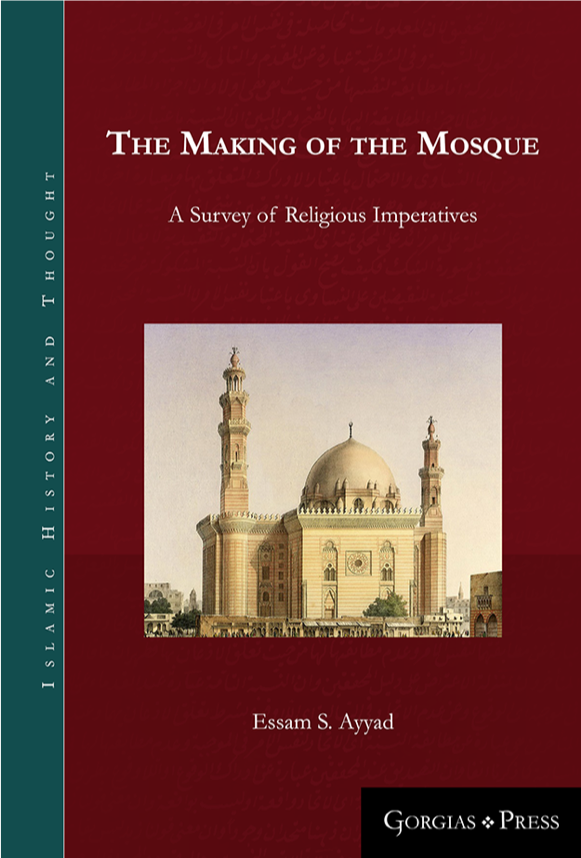New Publication: The Making of the Mosque by Essam S. Ayyad (Gorgias Press, 2019)
Gorgias Press has recently published a new book, The Making of the Mosque: A Survey of Religious Imperative, by Essam Ayyad. The Making of the Mosque is available to IQSA blog readers at the special price of $87.50 (30% off, RRP $125) until September 30th with the coupon code MM30%. Please note, this discount is only valid for orders placed through the Gorgias Press website and cannot be used in conjunction with any other offers. If you have any queries, please email gemma@gorgiaspress.com.
About the book: In the absence of reliable archaeological evidence, the question of how the mosque was made represents a real challenge. Its origin remains moot despite many attempts to settle the question. While the structure built by the Prophet Muḥammad at Madina soon after the Hijra in 622 AD is believed by many to have later provided the prototype of the mosque, the dominant theory that it was only a private residence casts doubt on that belief. The current study provides fresh evidence based on the Qurʾān, ḥadīth and early poetry that this structure was indeed built to be a mosque.
 For example, a key rationale for those who doubt the existence of a mosque in the Prophet’s time is the so-called “Qurʾān’s non-specific use of the term masjid.” The study presents a close survey of the usage of masjid (mosque) in the Qurʾān and concludes that the Qurʾānic use of the term to denote earlier God-worship sanctuaries does not mean that it, namely the term, had not been Islamized by early Islam; rather, it is the case that such sanctuaries were deemed Islamic. As such, the general use of ‘masjid’ to denote a variety of types of structure, or even specific devotional acts, does not necessarily exclude its denoting also an Islamic place of worship. ‘Masjid’ is used in the Qurʾān to mean place of worship generally and sometimes explicitly as an Islamic place of worship.
For example, a key rationale for those who doubt the existence of a mosque in the Prophet’s time is the so-called “Qurʾān’s non-specific use of the term masjid.” The study presents a close survey of the usage of masjid (mosque) in the Qurʾān and concludes that the Qurʾānic use of the term to denote earlier God-worship sanctuaries does not mean that it, namely the term, had not been Islamized by early Islam; rather, it is the case that such sanctuaries were deemed Islamic. As such, the general use of ‘masjid’ to denote a variety of types of structure, or even specific devotional acts, does not necessarily exclude its denoting also an Islamic place of worship. ‘Masjid’ is used in the Qurʾān to mean place of worship generally and sometimes explicitly as an Islamic place of worship.
The study further investigates what conceiving the Prophet’s structure as a “private residence” or a “mosque” may have to say apropos a number of undecided issues such as the immediate origins of the mosque type and the kind of impulses and modalities that determined its design and character. In a broader sense, this study seeks to explore whether early Islam, within the framework of the Prophet’s teachings and practices, as well as the Qurʾān, might have provided the necessary prompts for the making of the mosque and the shaping of its essential functional and architectural features. It also investigates how such religious imperatives may have interacted with the political, cultural and socio-economic contexts in which the mosque type materialized.
In so doing, this book scrutinizes two dominant tendencies regarding the mosque type: the modern Western views on its non-Islamic origins and the Islamic legalistic views on what it should look like. This survey is positioned at the intersection between art, historiography, religious sciences and politics; it is not a typical monograph on architecture. As readers will see, it cuts across topics such as early Islam’s outlook on visual arts and aesthetics in general.
Dr Essam Ayyad received his PhD in the history of Islamic civilization from the University of Leeds, UK, in 2011. He is currently working as an assistant professor of Islamic history at Qatar University. Before joining Qatar, he was elected to Imam Tirmizi Visiting Research Fellowship at the Oxford Centre for Islamic Studies, a recognized independent centre of the University of Oxford. He joined Oxford as a visiting research fellow during Trinity Term 2016. Earlier in 2015, Dr Ayyad joined the Centre of Islamic Studies, University of Cambridge as a visiting scholar. His main interest is to explore the array of prompts and modalities that shaped the various aspects of Islamic civilization, with most of his studies centring on the early period.
Content reproduced with the kind permission of the Essam Ayyad and Gorgias Press
© International Qur’anic Studies Association, 2019. All rights reserved.
